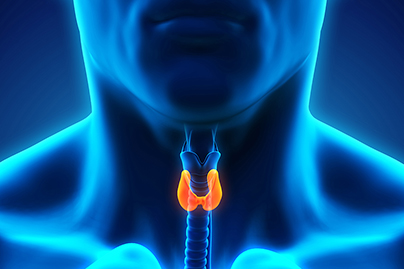Hypothyroidism involves an underactive thyroid gland that produces inappropriately low amounts of thyroid hormone, causing adverse effects on metabolism and function of the whole body.

Hypothyroidism results in deficiency of thyroid hormone, which is essential to metabolism. The prevalence of hypothyroidism is 3.7% among the general population. It can range from asymptomatic, subclinical hypothyroidism to a life-threatening swelling of the body’s tissues if the condition is severe and untreated.1 In developing countries, iodine deficiency is the main cause of hypothyroidism, leading to the development of a goiter (enlarged thyroid gland). Autoimmunity is the most frequent cause in the U.S., making diet the most important factor in the prevention of hypothyroidism.
The symptoms of hypothyroidism include:
The causes of hypothyroidism include:
A Nutritarian diet with plenty of high-nutrient GBOMBS (greens, beans, onions, mushrooms, berries, and seeds) improves gut health, which in turn, improves autoimmune conditions. It also reduces inflammation and will potentially decrease tumor growths and nodules.
Because of the lack of salt consumed in the Nutritarian diet, ensure an adequate daily amount of iodine. Supplement with 150mcg of iodine or a pinch of kelp daily. Iodine deficiency is not typically the cause of hypothyroidism, but nevertheless, it is worth assuring your intake is adequate before considering it irreversible.
While cruciferous vegetables contain small amounts of goitrogens, which prevent the utilization of iodine to make thyroid hormone, their content is so low and inactivated by cooking, so they are not a common cause or contributor to hypothyroidism, unless juiced and then consumed in very large amounts. Goitrogens present in food, even in substantial amounts, are only concerning if there is an inadequate intake of iodine.
I have seen a limited number of cases that were able to reverse autoimmune hypothyroidism with a Nutritarian diet, and all of those were people who were young with signs of early disease. I have not witnessed complete reversal of this condition once hypothyroidism has been present for years.
If there is permanent damage to the thyroid gland resulting in lower production of thyroid hormone, then supplementation with thyroid hormone is indicated. It is important to supplement with the lowest appropriate dose because an excess amount can contribute to the development of conditions such as atrial fibrillation and osteoporosis.
ONLINE: All members of DrFuhrman.com can search the Ask the Doctor archives for discussions on this topic. Platinum and Diamond members can connect with Dr. Fuhrman by posting questions in the forum. Not a member? Join now.
IN PERSON: Book a stay at Dr. Fuhrman’s Eat to Live Retreat in San Diego, California. With options ranging from one, two and three months (and sometimes longer) you will be under Dr. Fuhrman’s direct medical supervision as you hit the “reset” button on your health. For more information: (949) 432-6295 or [email protected].
EVENTS: Join Dr. Fuhrman for an online boot camp, detox or other event. During these immersive online events, you’ll attend zoom lectures, follow a special meal plan, and have access to a special, live Q&A session with Dr. Fuhrman. Learn more about events.
The following are sample questions from the Ask the Doctor Community Platinum and higher members can post their health questions directly to Dr. Fuhrman. (All members can browse questions and answers.)
I just got diagnosed with hypothyroidism. I want to know if I can cure this naturally, without Synthroid or other medications. Here are my results:
Free T3: 3.30 PG/ML
Total T4: 5.5 uG/DL
TSH 3rd Generation: 11.25 mIU/L
Are there other things I can investigate to find out why I have elevated TSH and how to fix it? Blood tests for iodine or other nutrients? I should mention, I do not always remember to take my multivitamins. With a TSH level that high, is it something that could go away if I take the two Women‘s Daily vitamins with 150 mcg iodine daily? Or is it too high to be solved so simply? Thank you.
It is unlikely that you can fix your thyroid gland, but it won‘t hurt to try, and make sure you take iodine regularly and see if it improves. Your TSH will continue to climb in spite of the extra iodine if it is not that. Other than that, none of the other things you mentioned can help.
So, it won't hurt to wait another 6-8 weeks with the supplement and recheck. It also won't hurt to take the lowest dose of Synthroid. Remember, you are just replacing a bit of something your body is not making enough of. It is not like taking medication.
Are there any exceptions for people who have hypothyroidism, or should they follow a strict Nutritarian diet? Would you advise them to go gluten free/avoid wheat?
There are no exceptions for thyroid disease, except just like everyone else, I recommend a regular supply of iodine in the diet, and the multi I recommend here has 150 mcg of iodine.
Also, eat but do not juice raw green cruciferous vegetables. There are studies showing the intake of cruciferous vegetables is good for the health of the thyroid and prevents cysts and thyroid cancer, however, avoid juicing because some people can over consume. Blending them is fine. The main issue is making sure you have an adequate intake of iodine, and do not decrease your consumption of green cruciferous vegetables.
There is no advantage to avoiding gluten or wheat except in rare cases. Hypothyroidism is unique and typically results from chemical or toxic exposure, not food sensitivity.